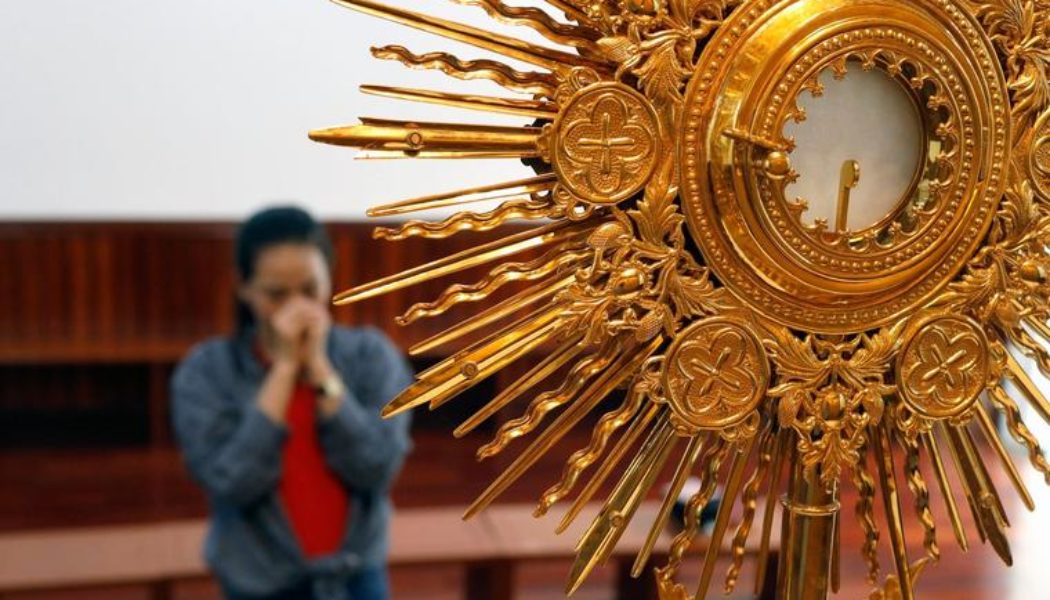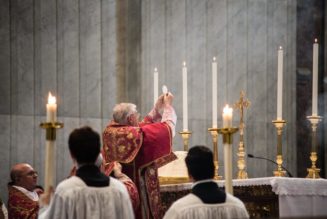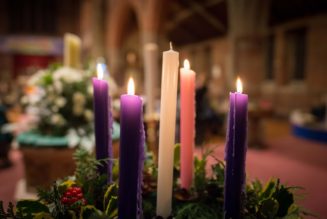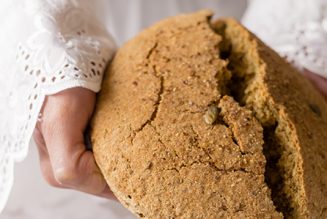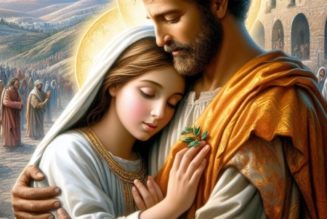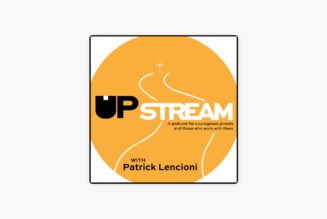
The Blessed Sacrament is just one of many reasons why I entered the Church.
On May 20, I took part in a Eucharistic procession that made its way through Washington, D.C., carrying the Body and Blood of Jesus Christ to the White House and other centers of power in our nation’s capital. At each stop, local priests — including Father Charles Trullols of the Catholic Information Center (CIC) and Msgr. Charles Pope — led a kneeling crowd in prayer for our country, our leaders and other intentions.
This was a new experience for me. As a recent convert to the Catholic Church, the idea that “the body and blood, together with the soul and divinity, of our Lord Jesus Christ … is truly, really, and substantially contained” (CCC 1374) was nearly impossible for me to grasp at first.
But the fact is that Jesus Christ — fully God and fully man — loves us each so much that he willingly suffered a brutal death for our salvation. Then he left us with an ability to unite with him both spiritually and bodily every day if we so desire.
As I moved from Judaism through Protestantism to the Catholic Church, there were three things I struggled to understand about the Holy Eucharist: First, why would God give us the ability to commune with him bodily, not just spiritually? Second, where in the Bible is it stated that Christ’s Body and Blood are truly present in the Eucharist? And third, does our world have any tangible evidence to help bolster our belief in this mystery of faith?
Reasons to Believe
The reason God made communion with him available to us both in bodily and spiritual form is so we, too, can experience the ultimate sacrifice he made for us on the Cross, and have the most intimate relationship with him — on earth and in eternity.
When people say they would die for something, it means they love something very much. But few would actually be willing to endure the most painful death imaginable, despite being completely blameless, for the sake of another person. Christ’s sacrifice was an act of complete self-giving so that eternity with him in Heaven — healed from all the brokenness in the world — is accessible to any.
Consuming his Body and Blood also disposes us to his unfathomable grace. We become one with him — as close and intimate as we could possibly be — by receiving his Body and Blood, which means we also experience his infinite grace and forgiveness.
Biblical Basis
As a Protestant, I relied on Sacred Scripture to justify my beliefs, just as Catholics do, but Catholics also have the magisterium and apostolic Tradition as a firm foundation.
In Exodus 12, to spare their firstborn sons from death — the final plague sent to Egypt by God — each Israelite family was commanded to eat an unblemished sacrificial lamb and to spread its blood on their doors to receive God’s grace and mercy. In the New Testament, Jesus — the new unblemished sacrificial lamb — instructs his disciples in Luke 22 to consume his Body and Blood in “remembrance” of him.
The word “remembrance” is misconstrued by Protestants to mean that the Eucharist is merely a symbol rather than Jesus’ true flesh and blood. But as Father Raniero Cantalamessa explains, all those who assist at Mass mysteriously become “contemporaries of the event: the event is present for us and we are present at the event,” not just recalling it in our imagination. In the words of the Catechism, Christ is present “in the Sacrifice of the Mass not only in the person of his minister, ‘the same now offering, in the ministry of priests, who formerly offered himself on the cross,’ but especially in the Eucharistic species” (1088).
Additionally, there is John 6, when Jesus affirms quite literally that anyone who “eats my flesh and drinks my blood has eternal life,” and that “the bread that I will give is my flesh for the life of the world.” When the crowd questioned him about how he could actually give his flesh and blood for them to eat, Jesus insisted by stating “Amen, amen” — in other words, firmly and solemnly — that he literally meant that if they did not “eat the flesh of the Son of Man and drink his blood” they would not have life within them.
Eucharistic Miracles
Finally, as an extra grace, we have the Eucharistic miracles that have occurred around the world for centuries.
Take, for example, the Eucharistic Miracle of Lanciano, which occurred in the eighth century in Italy. A local priest was doubting the real presence of Christ in the Eucharist until the Host was turned into human flesh, and the wine into human blood, coagulating into irregularly-shaped globules. Doctors examined this miracle in the 1970s, and confirmed that the flesh was tissue from the human heart and that the blood was human — both type AB.
Only God knows the full reason why the Holy Eucharist does not take on the qualities of human flesh and blood like this every single time a priest consecrates bread and wine. But that does not mean it isn’t happening.
The Holy Eucharist is just one of many reasons why I converted from Judaism and Protestantism. Thanks to so many selfless and wise spiritual guides — including my husband, Greg, and Father Trullols, who led the recent Washington Eucharistic procession — my understanding of the Holy Eucharist and Jesus’ sacrifice on the cross has changed my life forever.
